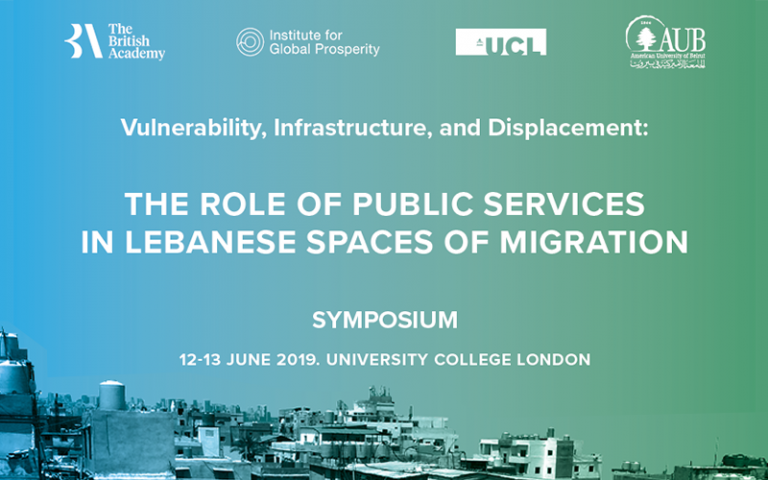Symposium: Vulnerability, Infrastructure, and Displacement
12 June 2019–13 June 2019, 5:30 pm–6:00 pm

Lebanon’s infrastructural and public service provision has long been fragmented and unequitable, but since 2011, it has been further stretched by the presence of a large number of Syrian refugees. The context of Lebanon’s long history with multi-layered and protracted displacement serves as an important case study to ask: How are non-citizens involved in the ‘public’ of public services? How does infrastructural exclusion or inclusion operate across spatial and temporal scales? And how can the co-design of infrastructures help overcome vulnerabilities?
This event is free.
Event Information
Open to
- All
Availability
- Yes
Cost
- Free
Organiser
-
Hanna Baumann
Location
-
University College LondonGower StreetLondonWC1E 6BT
Vulnerability, Infrastructure, and Displacement: the role of public services in Lebanese spaces of migration
Symposium
This interdisciplinary symposium will examine the links between vulnerability and infrastructure, with a particular focus on the contemporary Lebanese situation. Here, public service provision has been far from universal, and further stretched by the presence of a large number of refugees in recent years. We will consider vulnerability across spatial and temporal scales – from the embodied individual to the system or entire grid, from the layered histories of obdurate matter to the planning for the future that counteracting vulnerability and the provision of services require.
Public services are often linked to citizenship, indeed seen as a means to shaping citizenship – what does this mean in Lebanon, where since the civil war (1975-1990) the experience of the state has been manifested in the fragmentation and selective distribution of infrastructural provision? The context of Lebanon’s long history with multi-layered and protracted displacement opens up a range of questions we aim to address: How are non-citizens involved in the ‘public’ of public services? What are the different modes through which displaced groups are made vulnerable by way of formal and informal infrastructural systems? What role does infrastructure play as temporary displacement becomes permanent? How can the manner in which services are distributed, or circulate, create new vulnerabilities? And how can the co-design of infrastructures help overcome vulnerabilities?
This forms the concluding event of the British Academy-funded project Public Services and Vulnerability in the Lebanese Context of Large-Scale Displacement.
 Close
Close

